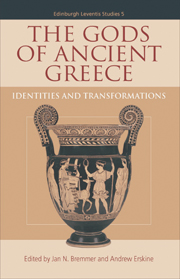Book contents
- Frontmatter
- Contents
- Preface
- List of Illustrations
- Notes on Contributors
- List of Abbreviations
- Introduction: The Greek Gods in the Twentieth Century
- 1 What is a Greek God?
- PART I SYSTEMATIC ASPECTS
- PART II INDIVIDUAL DIVINITIES AND HEROES
- PART III DIACHRONIC ASPECTS
- 14 Early Greek Theology: God as Nature and Natural Gods
- 15 Gods in Early Greek Historiography
- 16 Gods in Apulia
- 17 Lucian's Gods: Lucian's Understanding of the Divine
- 18 The Gods in the Greek Novel
- 19 Reading Pausanias: Cults of the Gods and Representation of the Divine
- 20 Kronos and the Titans as Powerful Ancestors: A Case Study of the Greek Gods in Later Magical Spells
- 21 Homo fictor deorum est: Envisioning the Divine in Late Antique Divinatory Spells
- 22 The Gods in Later Orphism
- 23 Christian Apologists and Greek Gods
- 24 The Materiality of God's Image: Olympian Zeus and Ancient Christology
- PART IV HISTORIOGRAPHY
- Epilogue
- Index
17 - Lucian's Gods: Lucian's Understanding of the Divine
from PART III - DIACHRONIC ASPECTS
Published online by Cambridge University Press: 05 August 2013
- Frontmatter
- Contents
- Preface
- List of Illustrations
- Notes on Contributors
- List of Abbreviations
- Introduction: The Greek Gods in the Twentieth Century
- 1 What is a Greek God?
- PART I SYSTEMATIC ASPECTS
- PART II INDIVIDUAL DIVINITIES AND HEROES
- PART III DIACHRONIC ASPECTS
- 14 Early Greek Theology: God as Nature and Natural Gods
- 15 Gods in Early Greek Historiography
- 16 Gods in Apulia
- 17 Lucian's Gods: Lucian's Understanding of the Divine
- 18 The Gods in the Greek Novel
- 19 Reading Pausanias: Cults of the Gods and Representation of the Divine
- 20 Kronos and the Titans as Powerful Ancestors: A Case Study of the Greek Gods in Later Magical Spells
- 21 Homo fictor deorum est: Envisioning the Divine in Late Antique Divinatory Spells
- 22 The Gods in Later Orphism
- 23 Christian Apologists and Greek Gods
- 24 The Materiality of God's Image: Olympian Zeus and Ancient Christology
- PART IV HISTORIOGRAPHY
- Epilogue
- Index
Summary
The only existing full-scale study of Lucian's thinking on the subject of the divine is that undertaken in the 1930s by the French scholar Marcel Caster. He came to what seems to me a startling conclusion, that Lucian was an atheist in the modern acceptance of the word; he was someone who went well beyond the Epicurean position, that there were gods, but that they did not intervene in the world, to the much more radical proposition that there were no gods at all. Caster had reached that judgement by telling himself that only someone who was seriously irreligious and who indeed thought the notion of the divine was a bad joke could have mocked the gods as Lucian did; Lucian's abiding concern was with preserving Greek culture from bad taste, ignorance and barbarity. It is possible to draw quite different conclusions, as I shall attempt to do, from much the same body of evidence.
To get at what Lucian himself thought is difficult. There are a number of reasons for this. For a start, Lucian virtually never, while speaking in his own voice, commits himself to a position on the nature of the gods and their place in the cosmic order. It is besides not at all easy to say when Lucian is speaking in his own voice and not that of a persona assumed for the moment.
- Type
- Chapter
- Information
- The Gods of Ancient GreeceIdentities and Transformations, pp. 348 - 361Publisher: Edinburgh University PressPrint publication year: 2010

